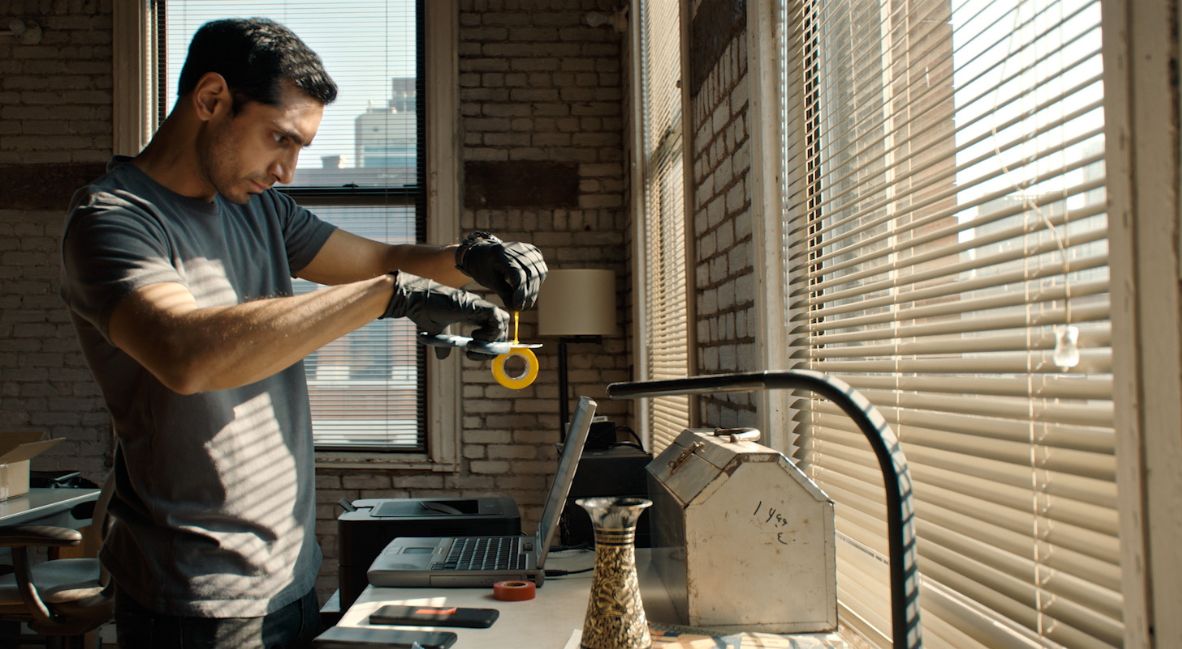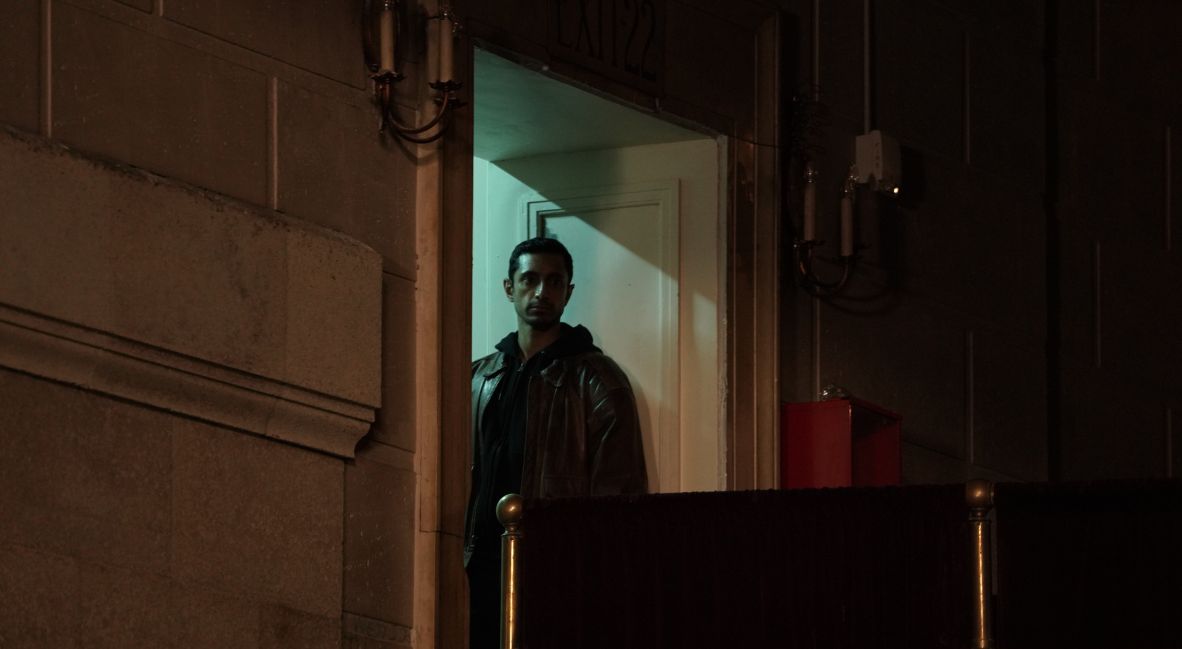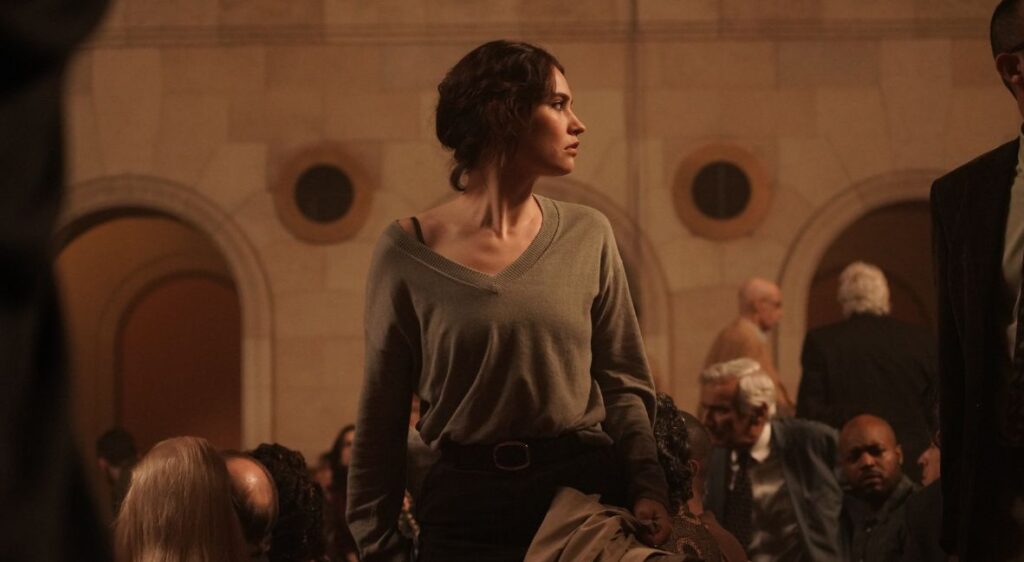Almost every frame of David Mackenzie’s Relay attempts to invoke the old-fashioned form and feel of the legendary paranoid thrillers of the 1970s. From the isolated, emotionally removed quirks of its protagonist, Ash (Riz Ahmed, a parallel to Gene Hackman’s Harry Caul in The Conversation), to its use of retro-coded technology in a contemporary setting, Relay plays with all the right pieces to craft a nervy, suspenseful callback to the genre’s heyday. Yet, what begins as an intriguing, modern analogue to experiences like The Parallax View or Three Days of the Condor struggles to stay the course, ending more as a cartoon rendering of those classics than anything else.
Riz Ahmed’s Ash is an enigmatic fixer who brokers deals between corrupt companies and potential whistleblowers. To maintain his anonymity and leverage, he contacts his clients using the titular “Tri-state Telephone Relay Service,” which keeps little to no records of its calls. While Ash’s peculiar process creates impenetrable degrees of separation between him and nosy clients, it’s also dependent on a solitary existence—something that doesn’t come easy for recovering alcoholics.
His lifestyle comes under threat when Sarah Grant (Lily James), a beleaguered ex-bio-tech company staffer, retains his services. She’s been on the run after stealing documents that, if made public, would be disastrous for her employer. Tired of constantly looking over her shoulder, she wants to return the documents for exchange for whatever compensation she can muster. Despite not knowing what Ash looks or sounds like, the two forge a connection that forces him into the light and in the crosshairs of a covert team headed by Dawson (Sam Worthington).
Relay attempts and fails to invoke the feel of a 70s paranoid thriller.

The narrative conceit at the heart of Relay creates several layers of separation between its characters, rarely even having them share the same frames. It’s quality that allows Mackenzie to foster an experience full of long, silent stretches that immerse us in the small, minute processes of its characters, as well as reckon with the loneliness embedded in our increasingly interconnected world. From the mechanical clacking of an analog teletypewriter to the cold, uncompromising machinery of Ash’s covert lifestyle, Mackenzie’s efficient, workmanlike direction captures the enormous repercussions of each tiny act.
In its opening moments, Relay’s 70s-infused DNA sets up a tale full of dramatic and emotional tension. There’s a great satisfaction in seeing Ahmed’s reclusive broker quietly outwit his foes through crafty manipulation of technologies both new and old, especially in a sequence where he practically weaponizes the US Postal Service. But as Relay enters its more character-driven, second half, it splinters into an entirely different kind of film, where dead air and snoozy exaggerated exchanges take the place of compelling characters and haunting atmospheres.
Though Ahmed’s brilliant performance of quiet inflections and glancing stares shines in the negative spaces between the heated interactions, it jars next to James and Worthington’s animated turns. At times, they feel as if they’re from alternate universes, where instead of a gritty 70s thriller, Mackenzie somehow taps into a 70s James Bond plot, particularly in moments that hinge on Dawson’s team of all-too expressive agents, who ham it up in segments that call for nuance.
Relay unravels in the final act and features a nonsensical twist.

Brain proves no match for brawn in Relay’s unravelling final act, which circles the drain of formulaic action beats that zap Ahmed’s technician of the very introspective, conflict-avoidant qualities that made him so fascinating. It all gives way to a nonsensical twist that finally turns Relay into the very kind of film its countercultural 70s influences rebelled against. Previous interactions that seem authentic in the moment often feel contrived in retrospect, robbing the film of its subtle, realistic core.
As Relay winds down into a cartoony, serviceable thriller, there’s no shaking the feeling that there’s a more rousing, full-bodied version of this story that keeps its 70s paranoid heart intact—one that instead takes on the perspective of the legally bound relay service agents that facilitate Ash’s bombshell conversations. But as it stands, we have to settle for Mackenzie’s ludicrous, morally apparent imagining of a “grounded” conspiracy thriller.
Relay will be in theaters on August 22, 2025.
Relay
-
Rating - 5/105/10
TL;DR
As Relay winds down into a cartoony, serviceable thriller, there’s no shaking the feeling that there’s a more rousing, full-bodied version of this story that keeps its 70s paranoid heart intact.







